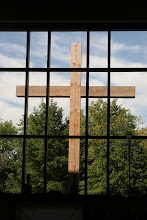“In the waters of baptism, we are reborn children of God and inheritors of eternal life.” (from the service of Holy Baptism, ELW)
“Woe, woe, O great city, Babylon the powerful city! For in a single hour your doom has come!”(Revelation 18:10)
As a pastor, I often get asked questions that I don’t have answers for, for example, questions about heaven and hell and God’s judgment.
Most people don’t really wonder about their own face to face meeting with God. As baptized children of God, we are confident that our baptismal promises hold up. Eugene Peterson observes that even in the face of accumulating and not-yet-avenged justice, it is most remarkable that communities of faith persevere in believing that God is just and will judge. (Reversed Thunder, p. 138)
We wonder about what will happen to the other people, the murderers, the child molesters, the cheaters, the atheists. It is a question we have been asking for thousands of years.
How long must I bear pain in my soul, and have sorrow in my heart all day long? How long shall my enemy be exalted over me? (Psalms 13:2 NRSV)
Why do we wonder about these “other” people when we are confident in our promise of salvation? Do we hope we can do something to help them turn around and repent? Or do we wish for them a swift and just punishment? Sometimes life doesn’t seem fair. We don’t always get, on this earth, what we deserve.
The book of Revelation shows us, in so many ways, the world in which we live. It provides “images that show us what is going on in our lives. ‘If there are mysterious powers around,’ a character in a Saul Bellow novel says, ‘only exaggeration can help us to see them.’” (Reversed Thunder, 145)
Revelation exaggerates not only what is going on around us, but it exaggerates our own lives, calls each one of us to examine how we live, and why we need to repent. Each of us will face God and be called to account for our lives. And each of us will be forgiven.
Revelation shows that God is in control of the whole universe in heaven and on earth. Revelation reminds us that our relationship with God begins with worship.
Eugene Peterson writes, “The word hallelujah occurs in Revelation for the first time in Chapter 19, verse 1. The timing is exactly right, protecting our gratitude and relief for judgment from degenerating into gloating over the judged… Longing for judgment is only a step removed from a demand for revenge. The desire for God’s judgment always totters on the edge of wanting to see our enemies writhe in pain. The saint, wanting God’s judgment to set things right, has a way of slithering into the sadist who takes pleasure in seeing his tormentors punished. [In Revelation] four hallelujahs pull us from the edge of gloating over pain and back to the act of worship where we are humble and adoring in the presence of the Glory.” (Reversed Thunder, 148-9)
“In the waters of baptism, we are reborn children of God and inheritors of eternal life.” Amen.
Monday, January 25, 2010
Subscribe to:
Comments (Atom)

